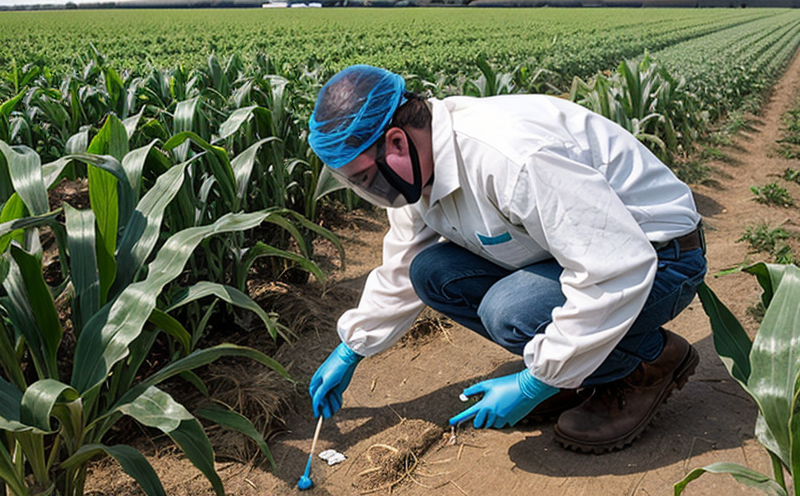2,4-D Residue Testing in Crops
The herbicide 2,4-dichlorophenoxyacetic acid (commonly known as 2,4-D) has been widely used by agriculture and forestry professionals for decades. It is an important tool for weed control but must be applied carefully to avoid contamination of crops with its residues. Understanding the presence and concentration levels of 2,4-D in agricultural produce is crucial for ensuring food safety standards are met.
Our laboratory specializes in providing accurate and reliable 2,4-D residue testing services that cater specifically to this need within the agriculture sector. With state-of-the-art analytical equipment and experienced professionals, we ensure every sample undergoes rigorous analysis following internationally recognized guidelines such as ISO/IEC 17025.
The process begins with proper sampling techniques which involve selecting representative parts of the harvested crop to test for pesticide residues. After collection, samples are carefully prepared according to standard procedures laid down by international standards like those from Codex Alimentarius or EU regulations related to Maximum Residue Levels (MRLs).
Once ready, our laboratory uses advanced analytical methods including Liquid Chromatography-Mass Spectrometry (LC-MS/MS) for precise quantification of 2,4-D in the sample matrix. This sophisticated technology allows us not only to detect minute traces but also differentiate between different forms of the compound which may have varying effects on human health.
After analysis, results are reported back to clients alongside detailed recommendations regarding future actions necessary to maintain compliance with relevant legislation and industry best practices. Compliance officers will find this service particularly valuable as they strive to uphold strict quality control measures throughout their supply chains.
In summary, our 2,4-D residue testing services offer peace of mind knowing that your agricultural products meet the highest standards of safety and quality. By partnering with us, you can rest assured that any potential issues related to pesticide contamination are identified early enough for corrective actions to be taken promptly.
Scope and Methodology
The scope of our 2,4-D residue testing includes determining the levels of this herbicide in a variety of agricultural crops such as wheat, barley, oats, corn, soybeans, cotton, fruit trees, vegetables etc. The methodology employed follows stringent procedures outlined by recognized international bodies like ISO/IEC 17025 for proficiency and accuracy.
- Sampling: Representative samples are taken from the field or storage area where crops are stored before processing into final products.
- Preliminary Screening: Initial tests are conducted to filter out non-compliant samples quickly. This helps in reducing costs associated with further analysis.
- Liquid Chromatography-Mass Spectrometry (LC-MS/MS): This highly sensitive method is used for quantitative determination of 2,4-D and its metabolites.
- Validation: All analytical methods undergo rigorous validation processes to ensure they meet the required precision, accuracy, linearity, specificity, robustness, reproducibility, and intermediate precision criteria.
The results obtained are compared against official MRLs set by regulatory authorities such as Codex Alimentarius Commission or European Food Safety Authority (EFSA). Any samples found to exceed these limits receive detailed reports highlighting the exact concentrations detected along with suggested corrective measures. Our aim is always to provide clear, actionable insights that help our clients maintain compliance and enhance product quality.
Competitive Advantage and Market Impact
Our laboratory holds a unique position in the market by offering comprehensive 2,4-D residue testing services tailored explicitly for the agriculture sector. Here are some of our key advantages:
- Rigorous Quality Control: We adhere strictly to ISO/IEC 17025 standards ensuring all results are accurate and reliable.
- Advanced Technology: Utilizing cutting-edge LC-MS/MS technology allows us to detect even trace amounts of 2,4-D in various crop types.
- Expertise: Our team comprises highly skilled chemists who have extensive experience working with pesticides and related compounds.
- Comprehensive Reporting: Detailed reports are provided which not only state the levels of 2,4-D detected but also offer recommendations for future action if necessary.
The impact on the market is significant as it ensures that consumers can trust the products they buy knowing they have been rigorously tested to ensure safety. For producers and processors, this translates into reduced risk of non-compliance penalties and enhanced reputation among customers who value sustainable practices.
Use Cases and Application Examples
Our 2,4-D residue testing services find application across multiple scenarios within the agriculture sector:
- Certification Programs: Many certification programs require strict adherence to MRLs for 2,4-D. Our lab helps farmers meet these stringent requirements.
- R&D Projects: Researchers involved in developing new formulations or methods of application can rely on our services to assess the efficacy and safety of their products.
- Supply Chain Management: Companies responsible for managing supply chains from farm to fork benefit greatly by using our testing services to ensure consistency across batches.
- Compliance Audits: Regulatory bodies conduct periodic audits to verify that producers are complying with relevant laws and regulations. Our reports provide robust evidence of compliance.
A specific example would be a large-scale grain exporter who needs to ensure their shipments meet the stringent import requirements imposed by countries like Japan or South Korea. By leveraging our testing capabilities, they can confidently ship products that comply fully with these standards.





